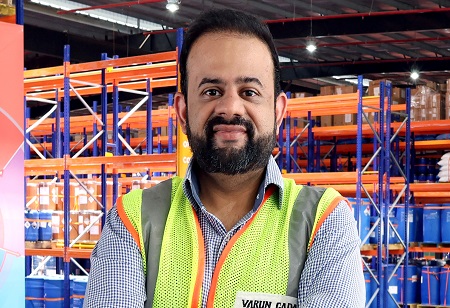
Varun Gada, a computer science graduate, transitioned from software development to become the CEO of a startup before taking the helm of LP Logiscience's warehousing division. With over 11 years of expertise in contract logistics, he led the company to rapid digital adoption and state-of-the-art warehousing. His initiatives, including Hand-Held Terminals and strategic property acquisitions, made LP Logiscience the preferred partner for international brands entering India.
As India's economy continues to grow at a rapid pace, the warehousing sector is witnessing a surge in demand for specialized storage solutions. Specialized warehousing, catering to diverse industries such as chemicals, pharmaceuticals, electronics, and food, plays a pivotal role in meeting the unique storage needs of these sectors. While the Indian warehousing and 3PL (Third-Party Logistics) and 4PL (Fourth-Party Logistics) sectors have demonstrated significant growth potential, there remain both opportunities and challenges that need to be addressed, in order to grow and match international standards of safety and operations.
Opportunities in Specialized Warehousing
The Indian warehousing and 3PL/4PL sectors have experienced substantial growth in recent years. According to industry reports, the warehousing sector in India was valued at over USD 10 billion in 2020 and is projected to witness a CAGR of approximately 10% in the next five years. This growth is primarily driven by the expanding e-commerce market, increasing demand for organized storage solutions, and advancements in technology. In addition to this, the country's growing focus on manufacturing, supportive policy infrastructure for Logistics, and increasing domestic consumption, are also driving this growth.
Challenges in Specialized Warehousing
Despite the opportunities, specialized warehousing in India faces several challenges. Specialized warehousing provides tailored solutions for industries with unique storage requirements, such as chemicals, cosmetics, pharmaceuticals, electronics, pharma etc., that require specific storage needs, to ensure product safety, quality, and longevity. Specialized warehousing facilities, equipped with advanced technologies and efficient operations, are well-positioned to capitalize on this burgeoning market segment.
One of the primary obstacles for this sector is the lack of standardized safety and operational protocols, particularly when compared to international standards. Ensuring compliance with stringent safety measures and certifications is crucial for storing sensitive and hazardous goods. Emphasizing safety and best practices in handling specialized goods can significantly reduce the risk of accidents and product damage.
Another challenge lies in the limited availability of Grade A warehousing facilities. Grade A warehouses adhere to international standards, offering modern amenities such as fire protection, security surveillance, high-quality flooring, and easy accessibility. The scarcity of such facilities hampers the seamless integration of specialized warehousing into the supply chain, thereby inhibiting the growth potential of the sector.
The Long Road to International Standards
To match international standards of safety and operations, the Indian specialized warehousing sector must focus on several key aspects. Implementing robust safety protocols and investing in advanced fire safety and security systems is essential to mitigate risks associated with specialized goods. Fast-paced tech adoption and integration of greener solutions are also vital. Regular training of warehouse staff in handling specific products and adhering to best practices can enhance efficiency and minimize product damage.
Moreover, creating a conducive environment for the growth of Grade A warehousing facilities is crucial. Encouraging private sector investments and offering incentives for the development of modern, well-equipped warehousing spaces can significantly elevate the sector's performance.
The rise of 3PL and 4PL service providers has further accelerated the sector's growth. Outsourcing logistics services to specialized providers offers businesses cost efficiencies, access to advanced technology, and a focus on core competencies. As the Indian economy continues to grow and modernize, the warehousing and logistics sectors are expected to play an increasingly significant role in meeting the evolving demands of industries and consumers.
Way Forward:
Specialized warehousing in India presents immense opportunities for businesses seeking tailored storage solutions for their unique products. Collaborative efforts between the government, private sector, and industry stakeholders are paramount to ensure timely investments in tech adoption, modernization, safety best practices, and integrated technological advancements. Concentrated efforts to enhance safety protocols, develop Grade A warehousing facilities, and foster a culture of efficiency and compliance, are vital for India to lead the way as a destination of choice for international economies. And a specialized warehousing sector can pave the way for putting India on the map of the international supply chain, by offering a safe, efficient, and globally competitive warehousing ecosystem.
We use cookies to ensure you get the best experience on our website. Read more...